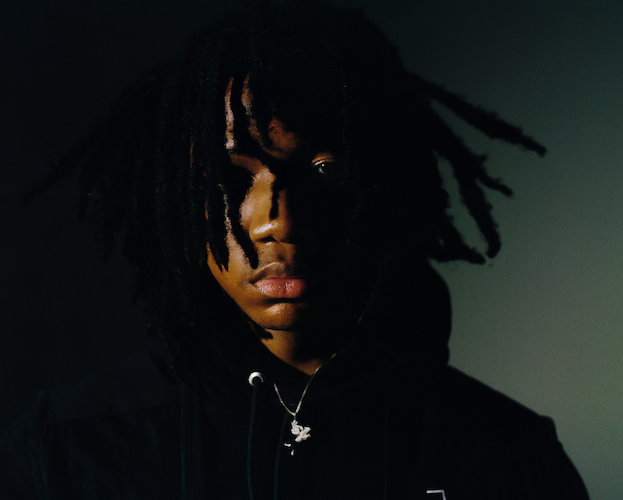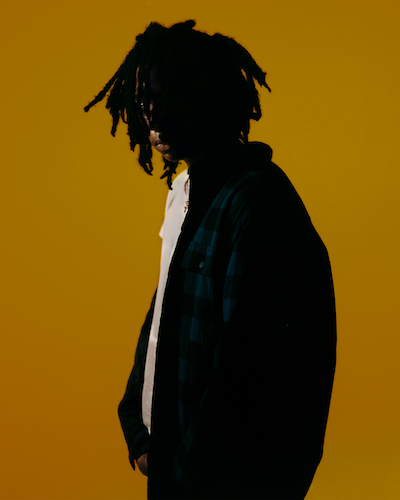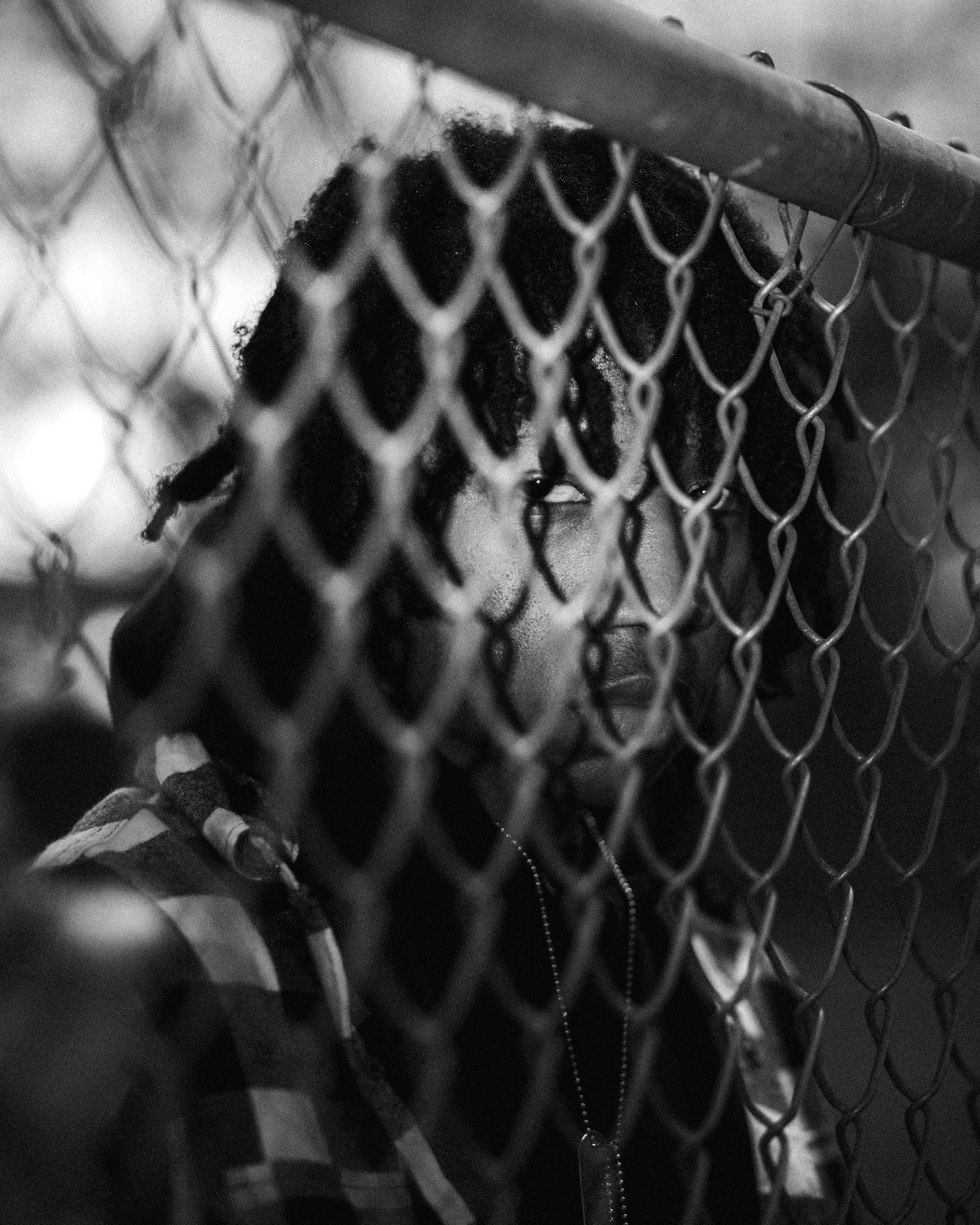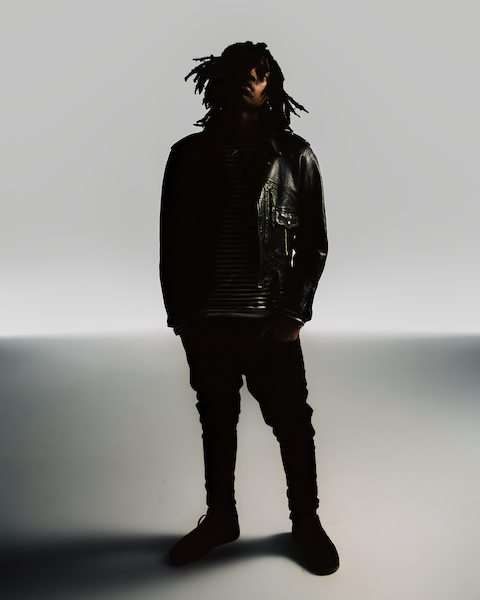Kenny Mason, Atlanta’s Genre-Blending, Rule-Busting Alternative Rapper Who’s Shooting for the Moon – “In Another Galaxy”
In an exclusive interview with VMAN, Mason speaks on the complexities of the Black male archetype, processing trauma through music and revolutionizing the rap game.

The fact that the April 16th release of rapper Kenny Mason’s raw, deeply felt new project Angelic Hoodrat: Supercut came in the midst of a spate of police killings of (mostly young) Black and Latinx Americans – Marvin Scott, Adam Toledo, Daunte Wright, Andrew Brown and Ma’Khia Bryant – and only four days before guilty verdicts against Derek Chauvin in the murder of George Floyd, shouldn’t be particularly surprising. Any given release date in any given month would likely fall in such a string of such killings, because it just doesn’t end.

“Hoodrat” is Mason’s term for not only a part of himself – he’s a proud Atlantan who bounced around from one part of the city to another in middle and high school, and calls the south side’s Zone 3 home – but also for the way white America, particularly those with badges, often reflexively views Black people, as dangerous or violent. It’s often only when we are burying them, after yet another “officer-involved shooting,” that a goodness about the victims is revealed. That dichotomy – between the perceived dark and the light, beast and angel, yin and yang, fascinates the rapper and singer – and it provided the concept behind his 2020 LP Angelic Hoodrat. In April of 2020, just as COVID was exerting its grip on us, Kenny served notice that he was one of the brightest new stars of the pandemic year, and one not inclined to follow any musical dictates but his own. While the album had its share of crowd-pleasing trap and rapid-fire bars, not least “Hit”, the bouncing breakout single from late 2019 that put him on many a radar – it also revealed Mason to be equally adept at sweetly sung vocals, alt-rock snarl, confessional lyrics about mental health and family drama, and experimental impulses. He’ll tell you he’s not a singer, but don’t believe him – just listen. Ken can do more with his voice – shouts, melodics, screams, and astute bars – than many of his better-known peers, with a dexterity that would put some of them to shame.
He’s doubled down on his left-field leanings on Angelic Hoodrat: Supercut, which dropped exactly a year and a day after its predecessor. Originally envisioned as a mere deluxe edition sporting a few new tracks, because of COVID, Kenny and his team, including producer Julian Cruz, had unexpected time to decamp to Tennessee and spend weeks working on new material – a dozen all-new songs that boldly push boundaries. There’s hazy, neo-psychedelic trap on “Fasho”; the lighthearted “A+”, with Kenny in a higher register and a feature from a kindred genre-blender, Denzel Curry; the laid back “More Money,” with the great Freddie Gibbs guesting; and the real jaw-dropper, “Play Ball” – Kenny singing over a crunching Warped Tour-ready guitar, as much rock as hip-hop. “Breathe Again” offers dreamy vibes, acoustic guitar, Radiohead inspiration and an Ambar Lucid feature, and no track is more packed with no-rules experimentation than the buzzsaw guitars, glitchy electronics, dog barks, and sonic twists and turns of “Pup.” It’s alt hip-hop from the future.

Kenny gets real and reflective on “Rih” and “4ever”, a rumination on angels, hoodrats, and youthful dreams of getting out of a dead-end existence. Those songs, and four more, are showcased in his recently-released live video Strays. With nothing more than an overhead spotlight and a mic, Mason delivers a powerful performance that serves as a preview for what’s to come when, pandemic-permitting, he finally takes the two remarkable Angelic Hoodrat albums on tour, hopefully, this fall.
With the right song and maybe some TikTok traction, artists can blow up nearly overnight today, at 16 or 17 – nowhere more so than in hip-hop. But Kenny’s rise has been more gradual. He decided he wanted to make music at 14, “got serious” about it five years later, at 19 – and it was five years after that, at 24, that “Hit” hit with the wider world. He’s now 26, and that’s okay. Those intervening years marked the time, Kenny says, when he was improving himself as a writer, performer, producer, and student of music past and present, including doing deep dives on punk, alternative, and indie rock. Plenty of Millennial and Gen Z rappers cite alt, grunge, and emo punk bands as influential – as Kenny points out, the internet has changed the game in terms of what is out there to discover – but Mason goes deep: My Bloody Valentine, Deftones, Pixies and The Smashing Pumpkins are as inspirational to him as ATL hometown heroes Gucci Mane, Young Thug, Bankroll Fresh and that master musical adventurer, Andre 3000 of Outkast. Mason wants his music to reflect it all – and more. “If you make rules” in music, Kenny says, “they have to be broken.”
VMAN talked to Kenny Mason about those influences over Zoom last week, as well as the difference between “biggest” and “greatest”, music as therapy, Atlanta’s impact on him, and his first – and worst – job ever, making donuts.
VMAN Kenny! First things first. Congratulations on Supercut and on this new live performance video, Strays. It’s incredible. How did that come about?
KENNY MASON Thank you! That means a lot. It was really my manager – Aditya’s idea to have a live showcase of the album. Because we were quarantined — we dropped the last album right when quarantine started, so shows was not an option. So, I think the idea was just to give people like that feeling still, virtually. And I didn’t know that people was gonna like it so much, cause it was just some freestyles, and I did a few songs that we had dropped. We didn’t really do no songs – we did one song from the first album, on the first one. But the rest of ‘em was just like, cool freestyles, and little loosies that I had dropped. But people really fucked with it, you know what I’m saying? I think it’s just like pretty much what I would choose for a show set. It’s really a concert at home, for the fans, the Doghouse.
VM There’s a line in “4ever” – a great song – about “angels as hoodrats” – which of course is the theme and title of these last two projects. And I saw you say in Rolling Stone that besides the term “hoodrat” referring to yourself, that it could be taken as referring to the way a lot of people look at Black Americans, as dangerous or violent.
KM I want to be as careful as possible when I answer this. When I was working on these songs, they were about me. Because my music can only be personal. You know? I can’t write a song about something that I haven’t seen, or that I don’t know about. It has to come from a place of experience, or my own self-dialogue. But I think in doing that – I’m a young Black male. So like, if I talk about things that I can identify with, then other young Black men will be able to identify with it. And so I think just a natural result of that is people being able to relate, and they will look at you as a voice, or as a representation of them. I don’t say that I can represent all Black people, but I am Black, and I am proud of it, and I think that people are gonna identify with things that I am talking about.
VM Because it occurred to me that Supercut came out just a few days before the Chauvin verdict in George Floyd’s murder, in the middle of another string of killings of young Black people. Just as last year’s Angelic Hoodrat dropped in between Ahmaud Arbery and George Floyd and Rayshard Brooks and on and on. Given this reality, are you ever inclined to make art that’s more political? Or would you rather keep it personal?
KM It’s a great question, and my answer is, if I am speaking the truth, it’s automatically gonna be political. If I am – I can go outside, and this is every day. It’s an everyday thing, you know what I am saying? My existence, as a Black man in America, is quote-unquote “political”. People have an opinion on me just because I got locks, or because my skin’s black. People are gonna have a judgement on me anyway. So, me speaking my truth – I am a walking political statement. But only I really know what that means, at the end of the day.
VM I’ve seen you say before that because of the pandemic you were able to go and make even more new music than you had anticipated, and I guess the other silver lining is that between these two records alone you’ve got more than enough for a live set, if and when you get to go and tour?
KM Yeah, I think when the pandemic hit I made a decision to really try to see the good that could come out of it. And I know a lot of people went through depression, and people lost people. Like I lost people, also. There were obviously a lot of negative things to get weighed down by. But I really wanted to decide, “I’m gonna use this time wisely.” And I said, “I’m gonna eat, better, try to get healthier, and I’m gonna make a whole bunch of music.” And that’s why Supercut even happened, too. It was supposed to just be a deluxe, it was supposed to be like, four extra songs. But I had so many demos, and then we went to Tennessee, and we made more songs, and I spent a month in Tennessee and made more songs, and I just realized like bro, there was a bunch of songs that I wanted to put out.
VM A couple of things about your hometown. Atlanta – apart from being such a mecca, for hip-hop and music in general, it’s also a city that looms so large in our cultural history and present-day. In the past year alone, from John Lewis passing, to Reverend Warnock being elected, to Stacey Abrams, to the election controversy, calls for boycotts – stories that are sad, happy, inspiring, tragic. What does it mean to be from a place they call the “Capital of Black America”?
KM I am proud to be from here. I grew up seeing Black people own things, and seeing a community that – if I go somewhere else, I am sensitive to the smallest differences in how Black people are treated. Because Atlanta is so black, and it’s a hub for Black leaders. Black leadership is encouraged here. Martin Luther King, his house is here, you know what I’m saying? It’s right there in East Atlanta, you can go in there and – I think seeing all that, growing up around all that, that goes into the music and culture here, the vibrancy of everything. And it goes into the community, bro. So, I won’t say it’s easy to be an artist here, but I will say it’s easy to be involved in the community of art and music – there are just so many resources for that here. And the light needs to shine on them more. Because it is also a lot of violence, and a lot of drugs, but I feel like that’s like any area, any city where there’s poverty you’re gonna get that. But in between that, there’s the art and the Black leadership, that’s what makes Atlanta what it is.
VM Atlanta has obviously meant so much to music. I am old enough to remember when the “Sound of Atlanta” was Jermaine Dupri and So So Def and TLC, but then there was Goodie Mob and Outkast, snap and of course trap. And then artists like yourself, who are bold enough to fuse genres, maybe borrow from alternative rock, whatever, and create your own palette.
KM Well it’s not just me – there’s a whole alternative scene here, artists who are into all different types of music. I know that trap is – when you think of Atlanta, you think of trap. Which is true, because it is a geographical reason for those sonics – why it sounds the way it sounds, and the culture of that music. But there’s other stuff here too, and they bleed into each other! To create something new. And with me, I think I am a hybrid of like – being around trap culture and seeing the things people talk about in them songs, in real life. And – seeing somebody selling drugs and then become a rap superstar. I’ve seen that. But I’ve also seen like real genre-bending, conceptual pieces of art. And even people who take all those things and experiment with drugs, psychedelics, I’ve seen it all. I’m influenced by all of it.

VM In a recent interview you said that age 19 was when you got serious about making music, and you had to sort of stop hanging out with friends who weren’t letting you grow and really dedicate yourself to this. Was that a hard thing to do?
KM I don’t think it really has to do with them – I’m still friends with a lot of those people that I was talking about. I think it has more to do with me, and not using hanging out with them as like, an excuse for why I haven’t made three songs today, you know what I’m saying? I ain’t wanna make it seem like I was blaming them, or they were the reason why I wasn’t blowing up, or working hard. It was me. It was me. Because I need to put myself in a position that forces me to progress. Constantly. So I had to make that change. And I think at 19, it was really just – I got a job, and I hated it, bro. My first job, and I hated it.
VM Can you say what it was?
KM It was Krispy Kreme, bro [laughs]
VM Oh, wow.
KM Yeah I had to get up every day at like 6 in the morning to get on the train, cause it was so far. I had to go all the way out there, and I’m just making goddamn donuts and shit. And the mothafucking managers is like fat and they teeth is fucked up…
VM Cause they eat too many donuts!
KM And they telling me like, “Yeah I be doing this for 15 years!” and I’m like, “Fuck no.” That shit terrified me, bro. I had that for like two, three weeks, and then I quit. And I was like, “I’m about to either do this shit, or die, bro.”
VM One of the unexpected songs on Supercuts is “Breathe Again” which has this ethereal quality and a feature from Ambar Lucid. I know you said it was originally gonna be part of “Handles” from the last record, but also – Radiohead was an inspiration for it?
KM Yeah, I had listened to all the hits of Radiohead before. But then Aditya really played The Bendsfor me. And I was like, “This is crazy,” the flow of the album, and sonics I hadn’t heard. And so I know some of that bled into it – because [Julian] Cruz made the chords for that song that same week. And I was just sitting with the chorus, and maybe like the following week – cause we were going into the studio every day, it was like a whirlwind, making new stuff every day. And probably the week after that, we took the original chorus that was “Breathe Again” and just like, modulated em, slowed em, and added all this warpy shit to ‘em.
VM People like to talk about your love of rock and, they’re like “It’s so crazy, he likes grunge or alternative.” And I mean, most of the young rappers I talk to are rock fans too. But you go deep. I think you’re the first rapper I’ve ever heard cite My Bloody Valentine as an influence. Or Deftones?
KM Oh, I love – like [seminal MBV album] Loveless, bro? It’s songs that – you can hear me trying to do that shit, but like in my own way. That album and – White Pony by Deftones? Those albums, bro, I studied them albums, the same way I do like Illmatic [Nas] or any great rap album.

VM And you’ve said, “I’m not trying to make a rock record,” but bro – some of your songs – “Play Ball” or “Titan”? They’re rock songs, I wouldn’t say they’re rap records.
KM [laughs] Well I’m rapping on them though! But yeah – I one hundred per cent know what you’re saying though, and that’s me trying to blur the lines between it all. I just don’t think there should be any divisions – until it’s its own thing.
VM It’s record labels that sometimes want to make those distinctions, and say, “Oh what do we do with this? How do we market this? Is it a rap record? Is it alt-rock?”
KM Yeah, well I’m lucky enough that my folks just let me be me, they don’t even try to like, figure it out. And most people don’t even know that they gonna like something until they hear it. You know? I think that’s needed. You can’t keep trying to section everything off and make it like – if you make rules, they have to be broken.
VM You had a song last year called “PTSD”, so did G Herbo with Juice WRLD, rest in peace.
KM There was like two more too.
VM Well, I ask because it seems like nowadays so many young artists in hip-hop, especially young men, talk about anxiety, depression, or even the drugs they use to numb it – in a way that they never used to. And it’s interesting because I have seen you say that you practice a kind of “detachment” from trauma in your life. But in the music, you seem more open about that stuff.
KM Yeah because it’s therapy for me, to do it that way. In real life, I don’t really like, share my emotions too much. I’m not quote-unquote “emotional” about certain things that I probably should be more open about – or that I’m allowed to be, but I don’t. But I feel like music is the therapy for that, 100 per cent. And I know people say that a lot, but it’s for real. I would be in a terrible headspace if I couldn’t make a song about things, if I couldn’t give all of them secrets to my mic. You know what I’m saying? [sighs] I feel like, in areas of poverty, inner-city areas, everybody got some form of mental health issue. Because violence and anger is a result of the scarcity – and growing up in that, and living in that, it can make you go crazy. And then they put drugs in the neighborhood, too. So now, it’s like – addicts. Now I’m growing up seeing addicts right outside my doorstep. Or in my family, you feel me? And all of that stuff shape you, bro. And the thing about it is, you’ll take pride in it because you do get certain character-building traits that are good, but that’s when it gets dangerous. And certain things get enabled – and not just enabled, they get praised. And that’s why the “angelic hoodrat” concept is so important for me to express, is cause you have to talk about the bad shit that come with the good shit. People need to be extremely aware of what they doing, and who they becoming.
VM But you would rather pour that into your music, than express emotion in daily life.
KM Yeah like if some shit going on, you know, I’ve had family members pass, this year, that passed away. And I ain’t even – I ain’t cried about it yet, I ain’t talked about it yet. I haven’t really processed it yet. And so that’s what I mean by a certain type of detachment. But I know that, through my creation, that’s where the therapy for it is really gonna happen. That’s just the way that I’m built. I been through a lot of shit as a kid and been in situations where I felt I had to grow up real fast. And I didn’t even have time to cry about certain shit, you know?
VM Finally – two recent headlines I’ve seen about you. The first one said: “Kenny Mason Is Aiming to Be the Biggest Artist in the World”. The other headline was: “The Atlanta Rapper Has No Taste for Fame – He Just Wants to Be the Best He Can Be”. So my question for you is….
KM [laughs]
VM Which is it? Or can they both be true? In your mind is there a difference between being the greatest and being the biggest?
KM I think that, for me, in my mind, for what is my vision, there is no difference. I one hundred per cent believe that. And look, “the best” is gonna be subjective to people, you know? Everybody is gonna have a different “best”. But for me – when I think of 3 Stacks [Andre 3000] – and just Outkast in general, when I think of them being so experimental, and boundary-pushing, and genre-fusing, creative and conceptual, you know, and not having any limitations on their creativity – but also having the highest-selling rap album of all time? Like bro, that’s what I think of – that you can go as far, and be as great as you envision if you work hard. And for me that’s just a daily motivation, it’s like a “shoot for the moon” type of thing. And I’m shooting for the moon in another galaxy, you know? That’s what motivates me daily, like, “How far can we go? How great can we be?”
VM But I know from listening to your record, you’re not trying to make just another “turn up for the club” type of record. You want to do more than that.
KM Well, I want to be me! But I know that I can make something that they play in the club, and it can change what the club even is. You know? I know that the generation of artists that I’m in is the generation that’s gonna change music, drastically. And I know the only way to do that is to be curious and creative, and that’s what I want to continue to be.
Kenny Mason’s Angelic Hoodrat: Supercut is out now
Discover More
